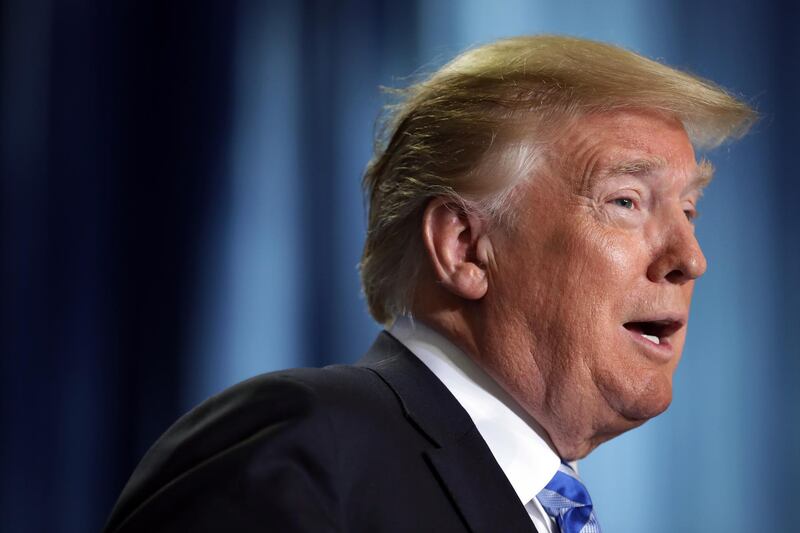One week before the US midterm elections, President Donald Trump took another hawkish line on immigration by appealing to his supporters in promising an executive order that would end birthright citizenship which grants anyone born on American soil a US citizenship.
Mr Trump renewed his campaign promise to abolish the citizenship right in an interview with the website Axios, only hours after announcing the dispatch of 5,200 US troops to the border with Mexico. The US President revealed his plans to sign an executive order that would undo the birthright citizenship.
“It was always told to me that you needed a constitutional amendment. Guess what? You don't," Mr Trump said.
Trump declares he can end birthright citizenship with an executive order: "It was always told to me that you needed a constitutional amendment. Guess what? You don't." pic.twitter.com/CAK07Kt11D
— Axios (@axios) October 30, 2018
He went on to say that the US is “the only country in the world where a person comes in and has a baby, and the baby is essentially a citizen of the United States...It's ridiculous. And it has to end.” According to Politifact, there are at least 30 countries that grant birthright citizenship, among them Canada, Brazil and Argentina.
But Mr Trump’s plans for an executive order triggered a legal debate about such a precedent, one that would undo the 14th Amendment to the Constitution from 1868.
The Amendment reads “all persons born or naturalised in the United States, and subject to the jurisdiction thereof, are citizens of the United States and of the State wherein they reside”. It was designed to grant US citizenship to the sons and daughters of the black population that was brought in during slavery.
Since then, however, illegal immigrants or visitors on tourist visas have used the law to obtain citizenship for their children who are born on US soil. That has driven an outcry within conservatives circles calling for the president to strike down the amendment.
Legal experts say that is easier said than done. They argue that even with an executive order from Mr Trump, abolishing the amendment will likely be blocked legal by federal courts or the US Supreme Court.
Paul Rosenzweig, a legal expert and a former deputy assistant secretary for policy at the Department of Homeland Security, said Mr Trump's statements "makes clear that the US President either doesn't understand the law or doesn't care what it says." He told The National that the debate about the 14th Amendment "explicitly considered this issue and opted for birthright citizenship…the Supreme Court has considered the issue and said that birthright citizenship is required Constitutionally".
“One can debate whether or not it is a good policy, but attempting to overturn a Supreme Court ruling by executive order is either ignorant or authoritarian,” Mr Rosenzweig said. About the chances of such order becoming a permanent law, the expert was dubious. “Unless the Supreme Court intends to overrule precedent that is more than 100 years old, the order will be a nullity,” he said.
_______________
Read more:
US to levy tariffs on remaining China imports if Trump-Xi talks fail
5,000 US troops deployed to border as Honduran migrants cross into Mexico
Democrats and Republicans shift election battle into courtrooms
_______________
Matthew Kolken, a US immigration lawyer, went even further. He anticipated that even Mr Trump’s newly appointed Supreme Court Justices Neil Gorsuch and Bret Kavanaugh would vote against his executive order. “Zero chance” he tweeted about the Court's odds to abolish the birthright citizenship.
There is ZERO chance either Gorsuch or Kavanaugh would find that a phone and a pen can abrogate the 14th Amendment. 0.0 to be exact. https://t.co/TBC8FuMyIe
— Matthew Kolken (@mkolken) October 30, 2018
But Mr Trump's plan has enthusiastic supporters within the Republican Party. Former White House official Michael Anton argued in The Washington Post last July that the amendment is being misread.
He referenced court rulings later that “only children of legal residents are citizens” and that “Congress could clarify legislatively that the children of noncitizens are not subject to the jurisdiction of the United States, and thus not citizens under the 14th Amendment”.
“Why shouldn’t the president act to defend the clear meaning of the 14th Amendment?” Mr Anton asked.
Daniel Horowitz of The Conservative Review wrote in 2015, that Congress has plenary power over naturalisation.
“The notion that illegal immigrants can unilaterally declare citizenship for their kids against the will of people and the laws duly passed by the people’s representatives, and that those representatives would lack a single recourse to stop it even prospectively, violates the very essence of consent-based citizenship,” he said.
In essence, if Mr Trump signs such an order, and a lawsuit by a State is filed, Mr Horowitz said: “judges faithful to their oaths will have no choice but to agree with him.”
But Ken Gude, a legal fellow at The Center for American Progress, said such a path will not stand up to legal scrutiny. Birthright citizenship, Mr Gude told The National "is in both the Constitution and statute. He [Trump] can't legally do it. If he tries it will be challenged. If he does it, it will be exactly the kind of abuse of power that the Framers believed was an impeachable offence."
“We are entering Orwellian territory if Republican judges claim that ‘all persons born’ does not mean all persons born” Mr Gude said.





